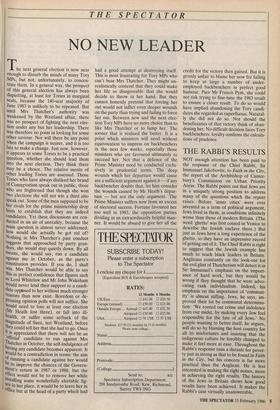THE RABBI'S RESULTS
NOT enough attention has been paid to the response of the Chief Rabbi, Sir Immanuel Jakobovits, to Faith in the City, the report of the Archbishop of Canter- bury's Commission on Urban Priority Areas. The Rabbi points out that Jews are in a uniquely strong position to address many of the questions which the report raises. Before 'inner cities' were ever invented as a term of political argument, Jews lived in them, in conditions infinitely worse than those of modern Britain. (The word 'ghetto' was first coined in Venice to describe the Jewish enclave there.) But just as Jews have a long experience of the ghetto, so they have an impressive record of getting out of it. The Chief Rabbi is right to suggest that the Jewish example has much to teach black leaders in Britain. Anglicans constantly on the look-out for the evil glint of Thatcherism will detect it in Sir Immanuel's emphasis on the import- ance of hard work, but they would be wrong if they thought that he were advo- cating rank individualism. Indeed, his emphasis on the importance of 'commun- ity' is almost stifling. Jews, he says, im- proved their lot by communal determina- tion: 'We rooted out crime and indolence from our midst, by making every Jew feel responsible for the fate of all Jews.' No people wanting to better itself, he argues, will do so by blaming the host country for all its misfortunes and insisting that the indigenous culture be forcibly changed to make it feel more at ease. Throughout the Rabbi's response runs a distaste for pover- ty just as strong as that to be found in Faith in the City, but his concern is far more practical than the Anglican. He is less interested in making the right noises, more in achieving the right results. The history of the Jews in Britain shows how good results have been achieved. It makes the Rabbi's case virtually unanswerable.





































 Previous page
Previous page